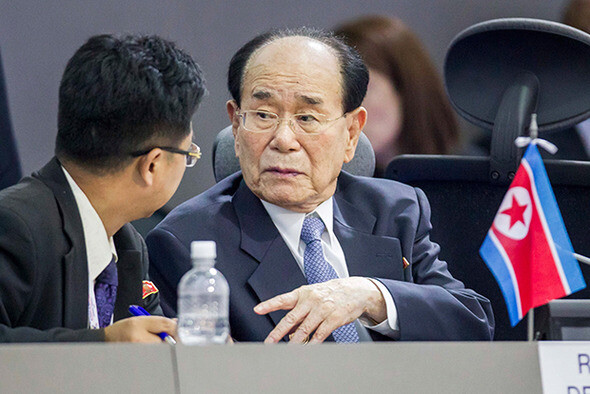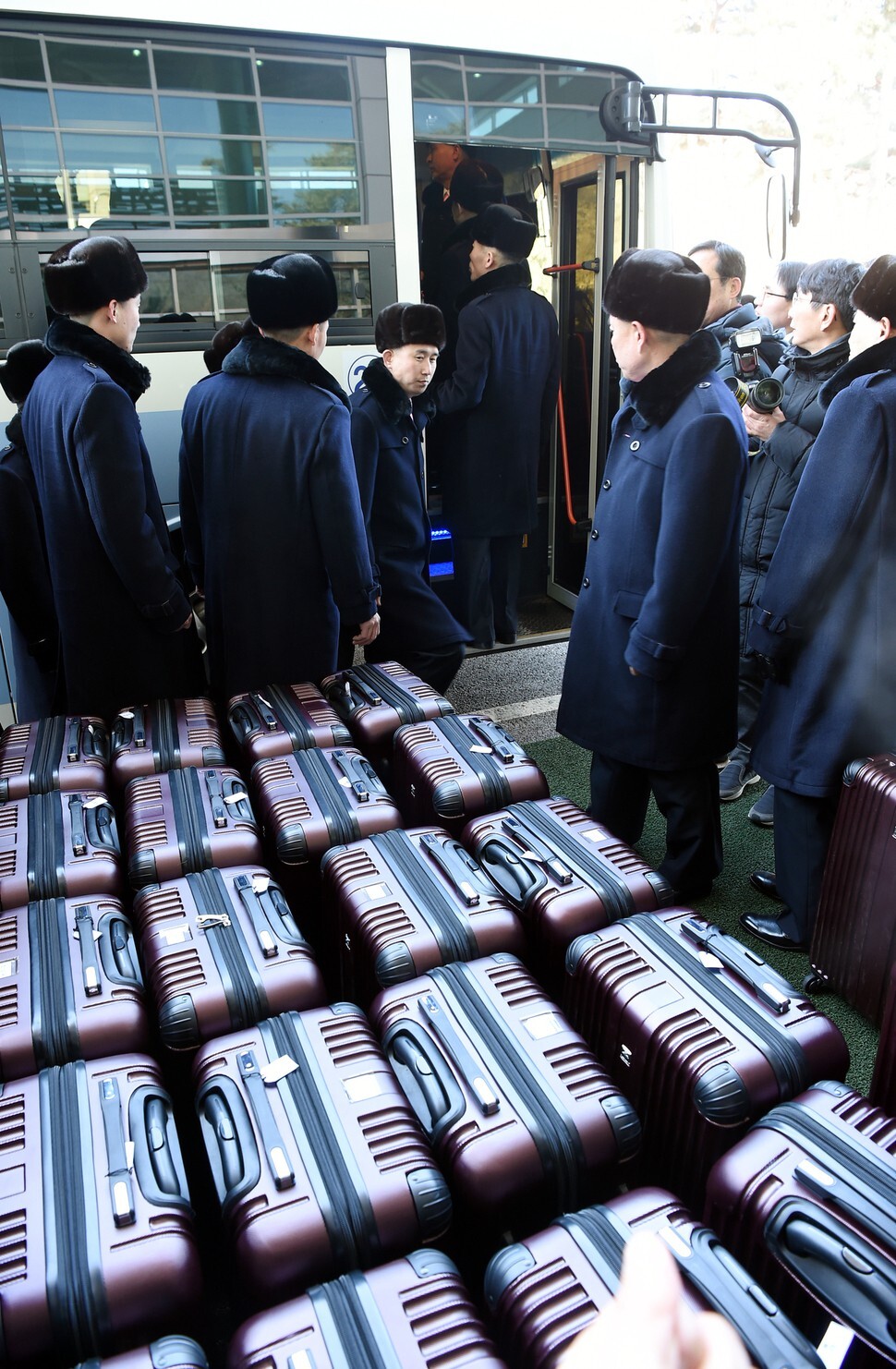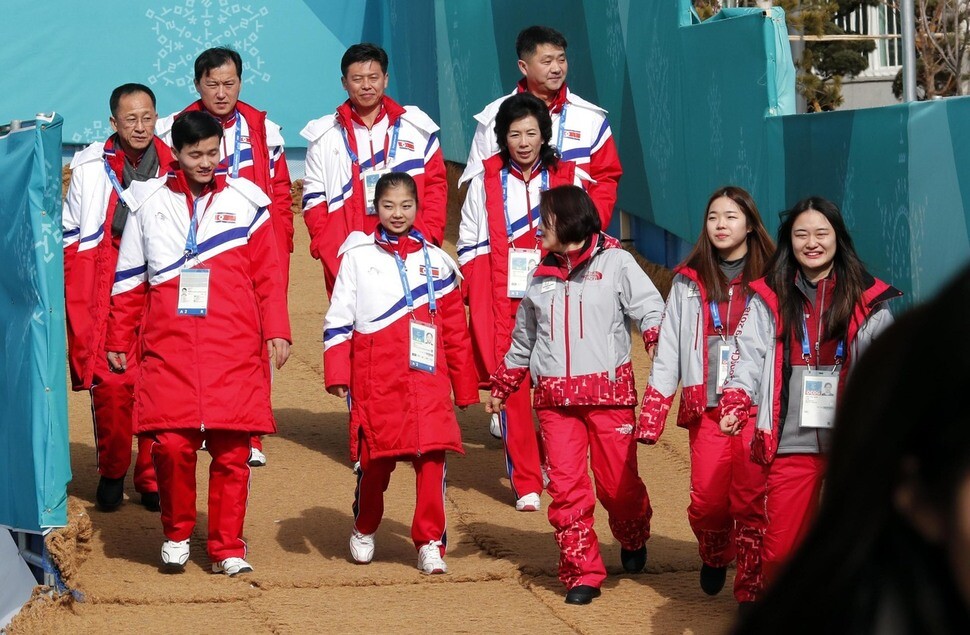hankyoreh
Links to other country sites 다른 나라 사이트 링크
[News Analysis] Officials accompanying Kim Yong-nam will provide clues to future of inter-Korean relations

By selecting Kim Yong-nam, the president of the Presidium of the North Korean Supreme People's Assembly, to lead the high-ranking delegation that will be visiting South Korea from Feb. 9 to 11 to celebrate the Pyeongchang Winter Olympics, North Korea can be said to have shown the greatest possible “sincerity” in terms of formality. But Kim’s symbolism aside, the identity of the three officials and 18 support staff who will accompany him to the South will aid predictions about the future of inter-Korean relations.
Article 87 of the North Korean Constitution declares the Supreme People’s Assembly to be the “highest organ of State power.” Article 117 states that the president of the Presidium of the Supreme People’s Assembly “represents the State and receives the credentials and letters of recall of diplomatic representatives accredited by foreign states.” This means that Kim is technically North Korea’s head of state. In fact, Kim attended the 2008 Summer Olympics in Beijing and the 2014 Winter Olympics in Sochi, where he engaged in “summit diplomacy.”
While Kim’s appointment as leader of the delegation elevates it to the highest level in formal terms, this also means that the substance of that delegation will depend on the three high-ranking officials who join Kim on his visit to South Korea. In contrast with a delegation to governmental talks, a high-ranking delegation is under no pressure to get results, which makes it better suited for exploratory dialogue. Through various kinds of interaction – not only official meetings but also meals, concerts and attendance at games – North and South Korean officials can gauge each other’s intentions and strategies.

Experts expect that North Korea will select the delegation’s members in reference to several factors, including relations with South Korea, which are usually handled by the Korean Workers’ Party’s (KWP) United Front Department and the Committee for the Peaceful Reunification of the Fatherland; foreign relations, including the North Korean nuclear issue; and representation of the KWP and the cabinet. The question of whether the momentum for dialogue can be sustained following the closing ceremony of the Pyeongchang Olympics will depend on the role they play.
“If North Korea has made the strategic decision to not only improve inter-Korean relations but also engage in dialogue with the US, it might place one of Kim Jong-un’s close confidantes on the delegation. It’s not inconceivable that one of the regime’s powerbrokers, such as KWP Central Committee Vice Chairman Choe Ryong-hae, could attend personally,” said Cho Seong-ryeol, chief of research for the Institute for National Security Strategy. The Blue House’s position is that the inclusion of one of Kim’s confidantes (even if it’s not Choe) would enable meaningful exploration of post-Pyeongchang scenarios for negotiations.
The fact that 18 support staff will be visiting South Korea is also likely to have a positive effect on advancing inter-Korean relations in the future. Aside from the fact that inter-Korean dialogue had been on hold for so long, this could lead to the most extensive interaction between working-level officials from the two sides since Kim Jong-un came to power. “If North Korean working-level officials responsible for relations with the South meet their South Korean counterparts and swap ideas during their visit to the South, it could really help maintain the momentum in the governmental talks moving forward,” said former South Korean Unification Minister Jeong Se-hyun.
Another intriguing question is whether US Vice President Mike Pence, who is attending the opening ceremony of the Pyeongchang Olympics, will have any personal interaction with the North Korean high-level delegation. Given the current state of North Korea-US relations, the prevailing view is that this would be a chance encounter rather than meaningful dialogue.
“It’s unlikely that North Korea and the US are going to reconcile their differences at Pyeongchang. The important thing is for them to get some idea about how to start full-fledged dialogue in the future,” said Kim Yeon-cheol, a professor at Inje University.

By Jung In-hwan, staff reporter
Please direct questions or comments to [english@hani.co.kr]

Editorial・opinion
![[Guest essay] The real reason Korea’s new right wants to dub Rhee a founding father [Guest essay] The real reason Korea’s new right wants to dub Rhee a founding father](https://flexible.img.hani.co.kr/flexible/normal/500/300/imgdb/original/2024/0423/8317138574257878.jpg) [Guest essay] The real reason Korea’s new right wants to dub Rhee a founding father
[Guest essay] The real reason Korea’s new right wants to dub Rhee a founding father![[Column] ‘Choson’: Is it time we start referring to N. Korea in its own terms? [Column] ‘Choson’: Is it time we start referring to N. Korea in its own terms?](https://flexible.img.hani.co.kr/flexible/normal/500/300/imgdb/original/2024/0423/3617138579390322.jpg) [Column] ‘Choson’: Is it time we start referring to N. Korea in its own terms?
[Column] ‘Choson’: Is it time we start referring to N. Korea in its own terms?- [Editorial] Japan’s rewriting of history with Korea has gone too far
- [Column] The president’s questionable capacity for dialogue
- [Column] Are chaebol firms just pizza pies for families to divvy up as they please?
- [Column] Has Korea, too, crossed the Rubicon on China?
- [Correspondent’s column] In Japan’s alliance with US, echoes of its past alliances with UK
- [Editorial] Does Yoon think the Korean public is wrong?
- [Editorial] As it bolsters its alliance with US, Japan must be accountable for past
- [Guest essay] Amending the Constitution is Yoon’s key to leaving office in public’s good graces
Most viewed articles
- 1[Guest essay] The real reason Korea’s new right wants to dub Rhee a founding father
- 2Terry Anderson, AP reporter who informed world of massacre in Gwangju, dies at 76
- 3[Column] ‘Choson’: Is it time we start referring to N. Korea in its own terms?
- 4Why Korea shouldn’t welcome Japan’s newly beefed up defense cooperation with US
- 5[Column] The clock is ticking for Korea’s first lady
- 6Opposition calls Yoon’s chief of staff appointment a ‘slap in the face’
- 7New AI-based translation tools make their way into everyday life in Korea
- 8[Editorial] Japan’s rewriting of history with Korea has gone too far
- 9[Reporter’s notebook] Did playing favorites with US, Japan fail to earn Yoon a G7 summit invite?
- 10[Column] The president’s questionable capacity for dialogue